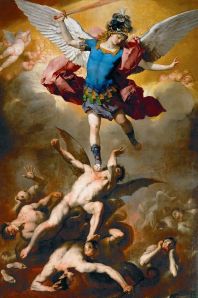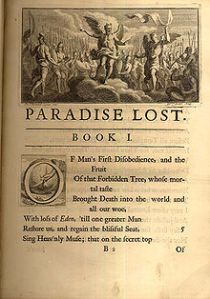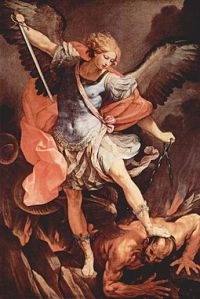Action Comics No. 1 was the Big Bang of the Golden Age of Comics, the start point for superhero history. Unless you count the actual Big Bang, which was about fourteen billion years earlier. Or, if you favor a different species of evidence, more like six thousand. Genesis 1:2 opens with a black hole: “the earth was formless and empty, darkness was over the surface of the deep,” followed by God’s “Let there be light,” the Biblical Big Bang.
Milton doesn’t give an exact date in Paradise Lost, but he says God created Earth just after booting Satan out of heaven:
There is a place
(If ancient and prophetic fame in Heav’n
Err not) another World, the happy seat
Of some new Race call’d Man, about this time
To be created like to us, though less
In power and excellence, but favour’d more
Of him who rules above;
That’s Beelzebub, one of Satan’s lieutenants, talking. He thinks attacking Earth is a better military strategy that storming Heaven. When Satan flaps across the void to check out God’s latest creation, Milton likens it to the wonder of looking upon “some renown’d Metropolis / With glistering Spires and Pinnacles adorn’d.”
Paradise Lost is basically a superhero comic book, with long slug fests between Lucifer’s League of Fallen Angels and Archangel Michael’s Mighty Avengers. My father remembers hearing the tale from the nuns in his school. He emailed me about that recently:
“Have you ever commented in your writings on what I consider the archetypal superhero plot, one that has its origin in the Bible? I’m referring to the story of archangel Michael being called on to save heaven from being taken over by Lucifer by having a violent confrontation with Lucifer and vanquishing him. This story is so embedded in the western religious psyche that to this day Catholics still pray to St. Michael to ‘defend us in battle’ with Lucifer.”
It’s not the sort of question you might expect from a retired research chemist, but my father only entered the field because he had his brother’s textbooks after his brother became a priest instead. My father’s colleagues were all theoretical physicists, but he preferred working alone in his lab. He said his job was playing Twenty Questions with God. Every day he had time for one: Does it have something to do with . . .
“The reason I think the Michael/Lucifer story is of critical importance is that it injected into the human psyche the concept of the need of an ubermensch (not a collective effort) to defeat evil and save the people. Ever since people are continually looking for such a person, most of the time to their eventual detriment when they believe they have found one. I believe this powerful subconscious longing in the western world for a superhero to save us from evil originated from the Michael/Lucifer story.”
“That’s pretty good, Dad. I hadn’t thought of Michael as the original superhero. I may have to flagrantly steal your insight.”
“I would be delighted if you chose to. An interesting part of the Michael/Lucifer myth is that it is not spelled out in any detail in the Bible. There is only a brief snippet about Michael slaying dragons in Revelation and that’s it – nothing about a great battle between Michael and Lucifer. In the long version, as I learned from the nuns, Lucifer is portrayed as the greatest and most brilliant of the angels. In his great pride, he decides to challenge God as the ruler of heaven. So God dispatches Michael to battle Lucifer, which he does, defeats him and sends him down to the lower regions. (Why an all-powerful God didn’t take on the job himself was never explained.) This long version came down through the centuries strictly through oral tradition. The fact that it has been retold countless times for probably over two thousand years demonstrates, I believe, its powerful grip on the human imagination.”
When I looked up Revelations 12, I couldn’t help imagining how Jack Kirby or Steve Ditko would illustrate the passages. The New Testament author even divides his script into panels. You just need some caption boxes:
[7] And there was war in heaven: Michael and his angels fought against the dragon; and the dragon fought and his angels, [8] And prevailed not; neither was their place found any more in heaven. [9] And the great dragon was cast out, that old serpent, called the Devil, and Satan, which deceiveth the whole world: he was cast out into the earth, and his angels were cast out with him.
I’d assign Rev. 20 to Neal Adams or Bill Sienkiewicz:
[1] And I saw an angel come down from heaven, having the key of the bottomless pit and a great chain in his hand. [2] And he laid hold on the dragon, that old serpent, which is the Devil, and Satan, and bound him a thousand years, [3] And cast him into the bottomless pit, and shut him up, and set a seal upon him, that he should deceive the nations no more, till the thousand years should be fulfilled: and after that he must be loosed a little season.
Daniel 12:1 makes Michael sounds like a superhero too: “At that time, Michael, the great heavenly prince, the grand defender and guardian of your people, will arise.” Thewarriorprince.us, a website devoted to him, says his “prime duty is to guard and defend the people of God collectively, and those who invoke him individually, from Satan and his demons, as well as their wiles and attacks.” And, according to Milton, those chains he uses on Satan are adamantine, basically Wolverine’s claws. No wonder God made him team leader:
Go Michael of Celestial Armies Prince,
And thou in Military prowess next
Gabriel, lead forth to Battel these my Sons
Invincible, lead forth my armed Saints
By Thousands and by Millions rang’d for fight;
Equal in number to that Godless crew
Rebellious, them with Fire and hostile Arms
Fearless assault, and to the brow of Heav’n
Pursuing drive them out from God and bliss,
Into thir place of punishment, the Gulf
Of Tartarus, which ready opens wide
His fiery Chaos to receave thir fall.



